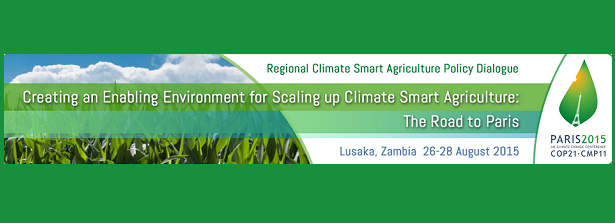
The FANRPAN Regional Policy Dialogue will take place three months before the 21st Conference of the Parties (COP21) of the United Nations Framework Convention on Climate Change (UNFCCC) in Paris, France in December 2015. The goal of COP21 is to get all countries to commit to a universally binding climate agreement. It is hoped that the COP21 will witness a “paradigm shift” where the climate challenge is not any more a necessary “burden sharing” of emissions, but also an opportunity for job creation and wealth, inventing new patterns of production and consumption.
FANRPAN
The Food, Agriculture and Natural Resources Policy Analysis Network (FANRPAN) is a regional multistakeholder policy research and advocacy network. The network engages with targeted constituencies at local and national levels, through its current 17 member countries in Africa. Within its Natural Resources and Environment thematic thrust, FANRPAN implements a number of Climate Smart Agriculture (CSA) projects supported by Africa Capacity Building Foundation (ACBF), Common Market for East and Southern Africa (COMESA), CORAF/WECARD, International Development Research Centre (IDRC) and the Norwegian Agency for Development Cooperation (NORAD).
Regional Policy Dialogue
The Regional Policy Dialogue will take place three months before the 21st Conference of the Parties (COP21) of the United Nations Framework Convention on Climate Change (UNFCCC) in Paris, France in December 2015. The goal of COP21 is to get all countries to commit to a universally binding climate agreement. It is hoped that the COP21 will witness a “paradigm shift” where the climate challenge is not any more a necessary “burden sharing” of emissions, but also an opportunity for job creation and wealth, inventing new patterns of production and consumption.
The content and discussions of the regional policy dialogue will draw on research from the following CSA focused FANRPAN projects:
Strengthening Policy Advocacy and Research Capacity for Enhanced Food Security in East and Southern Africa – Funded by the Africa Capacity Building Foundation (ACBF), the project seeks to strengthen the capacity of FANRPAN to support development of FANR policies in East and Southern Africa sub-region. One of the key objectives is to enhance the capacity of FANRPAN member countries to undertake advocacy on CSA policy formulation.
Programme on Climate Change Adaptation and Mitigation in the COMESA-EAC-SADC regions – Funded by the Common Market for East and Southern Africa (COMESA), the programme aims to support the inclusion of Africa’s unified position on climate change into 3 the post-2012 United Nations Framework Convention on Climate Change (UNFCCC) global agreement.
Supporting Smallholder Farmers in Southern Africa to Better Manage Climate-Related Risks to Crop Production and Post- Harvest Handling – Funded by the European Union and the United Nations Food, Agriculture Organisation (FAO), the project seeks to improve and sustain household and national food security in southern Africa through better management of climatic risks by smallholder farmers.
Stemming Aflatoxin pre- and post-harvest waste in the groundnut value chain (GnVC) in Malawi and Zambia to improve food and nutrition security in the smallholder farming families – Funded by the Platform for African – European Partnership in Agriculture and Rural Development (PAEPARD) , the project seeks to reduce pre- and post-harvest losses by reducing Aflatoxin in the Groundnut Value Chain (GnVC) for improved food and nutrition security of smallholder farmers by addressing main constraining factors of technology dissemination and adoption, knowledge and information sharing, and policies.
- This event has passed.

